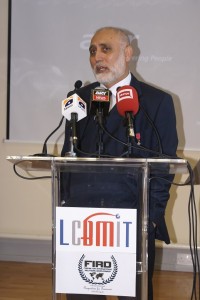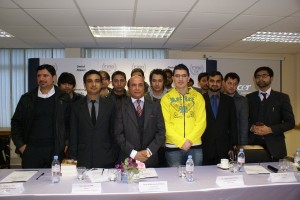
‘Judicial Activism has strengthened democracy in Pakistan. Sometimes the Apex Court gets under pressure to play to the gallery due to the role of masses in its restoration. Pakistan Supreme Court has topped in the suo motu in the world but we welcome the initiative. Judiciary has taken bold steps in empowering the democratic institutions.’ Governor Punjab Muhammad Latif Khosa shared these thoughts while speaking at FIRD Dialogue Forum at Forum for International Relations Development, a UK based think-tank. He was speaking at the symposium, organised by LCBMIT and FIRD, titled ‘An Appraisal of Judicial Activism in Pakistan’. Governor Khosa reviewed the history of the judicial crises in Pakistan and shared that the latest initiative to declare high treason against the judges and generals alike who might take an unconstitutional step in Pakistan. He asserted It was peoples prerogative to promulgate the constitution as the courts can’t legislate. He criticised that the founding fathers were side-lined in the first two decades after the inception of the country. He shared that it was General Ayub who owed the seeds of alienation of West Pakistan by making 80,000 basic democracy members out of 100 million Pakistanis. He stressed it was Zulfiqar Ali Bhutto who was the first to cry out that masses were the fountainhead of real power. He welcomed the decision in ASGHAR Khan’s case terming it to set another precedent against setting up secret cells to steal the writ of the people. He claimed that Pakistan people Party was pursuing the Bhutto trial not to embarrass the Court but to wipe off the blot of judicial murder off its forehead. He dubbed the passing of 18th, 19th and 20th Amendments historic by laying down rules of the game for the appointment of Chief Election Commissioner and Caretaker Government. Summing up the arguments, Governor Khosa declared Judicial Activism a good sign for Pakistan and he took pride in his part in restoration of the Chief Justice of Pakistan.
Wajid Shams-ul-Hassan, the High Commissioner of Pakistan commented that Pakistani nation was deprived of its soul through a mechanised and planned manner through which rationality and dialogue were replaced with muscles and ignorance. He shared that the founding fathers of the nation were marginalised through a witch-hunt and it was ensured that masses would lose their trust in leadership. He asserted that the trust of masses has to be restored to support the democratic process in Pakistan.
Toaha Qureshi MBE, Chairman FIRD and Pricipal LCBMIT, said that all institutions should work within their jurisdiction. “Mud-slinging at institutions is tantamount to defaming the country. We can only move forward by working with each other. Pakistan’s strength is in the strength and stability of the institutions,” Qureshi said. He emphasised that when democratic system was wrapped up, the next attack was on the judiciary.
Qureshi highlighted that parliament was the mother of all institutions. He pointed out that army had its own system and the parliament its own. Qureshi asserted that the institutions should not build their own islands as strengthening institutions meant strengthening the country so they should become enablers instead of disablers. Qureshi said , ” Suo motu is the buzzword in Pakistani public discourse post 2008 lawyers’ movement and the subsequent ‘independence’ of judiciary. If the judges care about judicial authority and genuine respect in the long run, they should observe extraordinary self-restraint, not just in the courtroom, but also with respect to their extrajudicial statements and speeches”.

FIRD Fellow Philp Lingard held that in many countries, efforts were made to create a balance in the powers through clauses enshrined in the Constitution. ‘The concept of a judge acting as a referee or umpire in the political game has been used throughout American jurisprudence, but was made famous by Chief Justice John Roberts during his confirmation hearings for the Supreme Court when Roberts said: “Judges are like umpires. Umpires don’t make the rules; they apply them.’
Saad Mahmood offered the vote of thanks to the guests and audience for taking time out to attend such an important seminar.
The seminar was attended by a large number of researchers, students and community members.
![[X] Close](http://www.fird.org.uk/wp-content/themes/fird/images/close.png)





